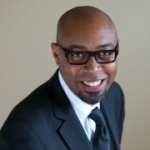2015 Speaker Spotlight: Eric Dozier
Growing up in a black church in Tennessee, Eric Dozier had a broad range of musical influences, including gospel greats Shirley Caesar, Walter Hawkins and James Cleveland. Outside church he was listening to B.B. King, Stevie Wonder, Marvin Gaye and Earth Wind & Fire. He had the best of both worlds.
“And then in high school I went to an all boys private school and was exposed to classical music. I played piano, sang in the glee club and played hand bells all through Europe on tour,” laughs Dozier.
At Duke he initially studied engineering but soon changed to public policy because he really wanted to address cultural issues and somehow use his music to do it.
“Even though I had all this music in my life, being a professional musician was actually not my dream. But music was so pervasive in my life, the universe said, ‘this is what we want you to do.’ So I listened.”
Wanting to focus his public policy work on youth, race and education, he got his first opportunity when he volunteered with Big Brothers, Big Sisters.
“Music became the modality I used to reach them. As opposed to using public policy to address a particular issue they had, I would write a song, put a choir together, do a concert or even just have them singing on the street corner.”
Though he didn’t know it then, Dozier was on his way to becoming a cultural activist – a person who uses cultural understanding and tools to engage people in meaningful discourse about social issues.
“Social activism lies in the heart of African American music. It’s the music and story of people who had vision and wanted to affect the world. The old spiritual “He’s Got the Whole World in his Hands” let everyone know that God cared about enslaved people, too.”
Dozier says that America has a very dynamic history of singing for social change. The civil rights, women’s, labor and suffragette movements all had music that helped them affect social change. He wants young people today to understand this past and realize that a soul song like Marvin Gaye’s “What’s Going On?” – the quintessential protest song – didn’t just evolve in isolation. Soul music came forth from spiritual and gospel.
Through his work with the Harlem Gospel Choir, the One Human Family Music Workshops and the Young People’s Freedom Song Initiative, Dozier keeps his eyes on the prize: to share the love and history of African American music across the world and help it continue to affect social change.
“Music is the lynchpin. We can hit a lot of messages with it. We can use it to teach our kids, reconstituting what we were and remaking the world through our songs.”
+ + +
Rosemary Taylor is a writer and digital content strategist; rosemary@prfocus.net


Leave a Reply